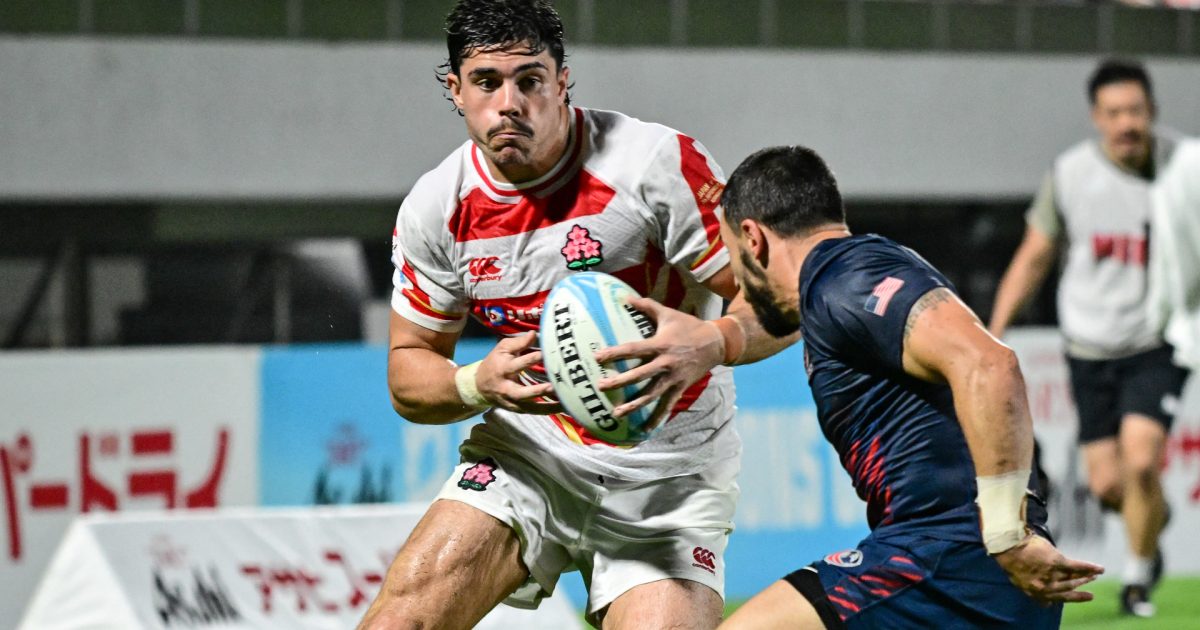The Durban-born former Australia U20 rep who is now Japan's strike centre

On September 8, at the Kumagaya Rugby Stadium, Japan’s match against the USA could easily be dubbed “Riley’s Day.” With his stellar performance both in try assists and scoring, Dylan Riley was a force to be reckoned with and was rightfully named Player of the Match.
At 15 minutes into the first half, Riley caught a kick-pass from fly-half Seungsin Lee near the opposition’s 10-meter line. Despite losing his balance, he delivered an offload with his left hand to outside-center Nicholas McCurran, who scored the opening try. At the 23rd minute, Riley once again contributed, receiving a pass from scrumhalf Shinobu Fujiwara and bringing the ball close to the goal line, setting up lock Sanaila Waqa for the second try. At the 38th minute, he was involved again, helping hooker Mamoru Harada score in a similar situation.
Riley’s individual brilliance peaked at the 5-minute mark in the second half. Starting from the middle of his own half, he sidestepped inward, gained ground, and then cut outside, outrunning defenders to dive into the in-goal area. In each instance, his speed, power, and refined skills stood out. The initial try assist came from a particularly difficult kick-pass that was almost over his head.
“I knew exactly what I needed to do from the start. I just focused on executing it accurately,” said Riley. Despite his consistent high-level performance throughout the 80 minutes, he downplayed it, saying, “I just focus on contributing to the team as much as possible without overthinking things.” His cool-headedness remains evident, even in his comments.
Born in Durban, South Africa, Riley moved to Queensland, Australia with his family. Though he has experience with the Australia U20 team, his professional rugby career truly began after moving to Japan.
This particular match held special significance for Riley. Kumagaya Rugby Stadium is the home ground of his club, the Saitama Panasonic Wild Knights. Although the fans in the stands were dressed in red and white Japan jerseys, not the familiar blue of the Wild Knights, the crowd roared every time a Wild Knights player’s name was announced. It was exactly the scene Riley had imagined when he said before the match, “I’m excited to play in front of the local fans.”
The last Test match held at this stadium was five years ago, on September 6, 2019, when Japan played South Africa. That match was Japan’s final warm-up before their home World Cup.
At the time, Riley was one of the 22,258 spectators, watching from the upper section of the main stand. Having only joined the Wild Knights the previous year in 2018, he was still relatively unknown. Fast forward five years, and Riley now stands as a central figure for the Brave Blossoms, playing on the very field he once observed from afar. Reflecting on this milestone, he said, “I remember sweating buckets five years ago, too.” It’s a fitting sentiment, considering Kumagaya is known as one of the hottest cities in Japan.
Riley earned his first cap for Japan on October 23, 2021, in a match against Australia. He started in three of Japan’s four games during last year’s World Cup. While he was still considered a young player under former head coach Jamie Joseph, Riley has now become the most capped backline player after the recent coaching change, starting in the USA match. In just a short time, his role within the team has significantly evolved.
“The environment around me has changed, but my role of influencing those around me through my actions on the field hasn’t,” Riley explains. “The team is led by Haru (Tatekawa) and Sakate, and I try to offer support to younger players when they get emotional after making mistakes or when they need connection off the field.”
As demonstrated in the match against the USA, Riley is indispensable in Japan’s efforts to play high-speed rugby. Head coach Eddie Jones is also highly impressed with Riley’s talents.
“He’s a rare player with the strength of a center and the speed of a winger. The next step for him is to improve his quality actions. He needs to work on getting more involved in the game. I think he has the potential to be the best number thirteen in the world.”
Should that happen, big clubs around the world will likely come calling, but Riley is adamant about his future: “I like the environment I’m in now. I want to continue building my career here up until the next World Cup.” His sights are already set on 2027, when the World Cup will be held in his homeland of Australia.























































